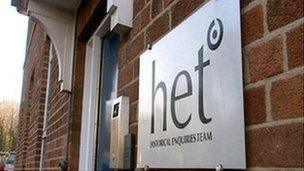NI Policing Board declares 'no confidence' in HET
- Published

The HET was reviewed by HMIC
Northern Ireland's Policing Board has said it has no confidence in the leadership of an organisation set up to re-examine deaths during the Troubles.
The Historical Enquiries Team (HET) was criticised on Wednesday by Her Majesty's Inspectorate of Constabulary.
It said the HET was illegally investigating deaths involving army soldiers with less rigour than cases with no state involvement.
The board said it viewed all HET military case reviews as suspended.
In a statement the Policing Board chair Anne Connolly said Thursday's discussions centred on agreeing a course of action "that deals with the very serious organisational, governance and oversight issues outlined by HMIC".
"The board has no confidence in the leadership of the Historical Enquiries Team and the chief constable has been asked to review and action the management arrangements of the unit with immediate effect," the statement said.
"It is the view of the board that all military case reviews by the HET are suspended.
"The HET should continue the process of conducting all other reviews but it should not finalise any cases until all the necessary reforms are completed."
In response to the question of confidence in the HET's leadership Mr Baggott said it would be "premature" to enter into that discussion until he has spoken to the HET director Dave Cox in depth.
"I would be anxious not to reach any judgements that are disproportionate, particularly since the individual has his own employment rights as well, and I'm mindful of the fact that the report itself says the issues can be fixed and there is a high degree of concern that the HET continues," he said.
"I am confident that the work of the HET can be continued in bringing resolution to the families of the victims of the Troubles while at the same time not underestimating the concerns that have been raised through this report and the need to fix them."
Mr Baggott also offered a personal apology to Professor Patricia Lundy, the University of Ulster academic whose research initially raised concerns over the HET and led to the HMIC review.
"Her personal reputation is very much intact and to her a personal apology if her concerns were not taken seriously enough when they should have been," he said.
Mr Baggott outlined a series of measures he planned to take in response to HMIC's criticisms.
"I will be suggesting to the Policing Board that we ask the HMIC to come back in a relatively short space of time to give us an independent assessment of progress against those recommendations, particularly in the areas of policy and consistency," he said.
"I would like to go into cases which HMIC looked at to see whether there have been any missed investigative opportunities which in terms of bringing people to justice we can take forward."
The Policing Board also announced that the recommendations made by the HMIC would be implemented by a working group made up of political representatives and independent figures.
The group will also review police "failures to respond promptly to issues raised in relation to the work of the HET".
The group will begin its work next week and a report on progress is expected later in the year.
HMIC described the HET's approach as "illegal and untenable".
Mr Baggott agreed to a board request to commission the review after criticism of HET in Professor Lundy's University of Ulster report.
The report had claimed the HET gave former soldiers preferential treatment and did not properly investigate deaths caused by the military. The HET rejected the claims.
HMIC's report found the HET treats cases involving military differently as a matter of policy and this appeared to be based on a "misinterpretation of the law".
It also found that the HET did not always seek verification where a potential interviewee in a state involvement case claimed to be unfit for interview due to illness.
The HET was set up in 2005 to re-examine 3,260 murders.
- Published4 July 2013
- Published3 July 2013
- Published3 July 2013
- Published4 April 2012
- Published2 July 2010
- Published5 April 2012
- Published3 April 2012